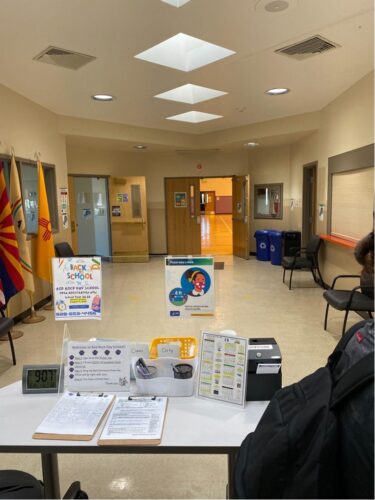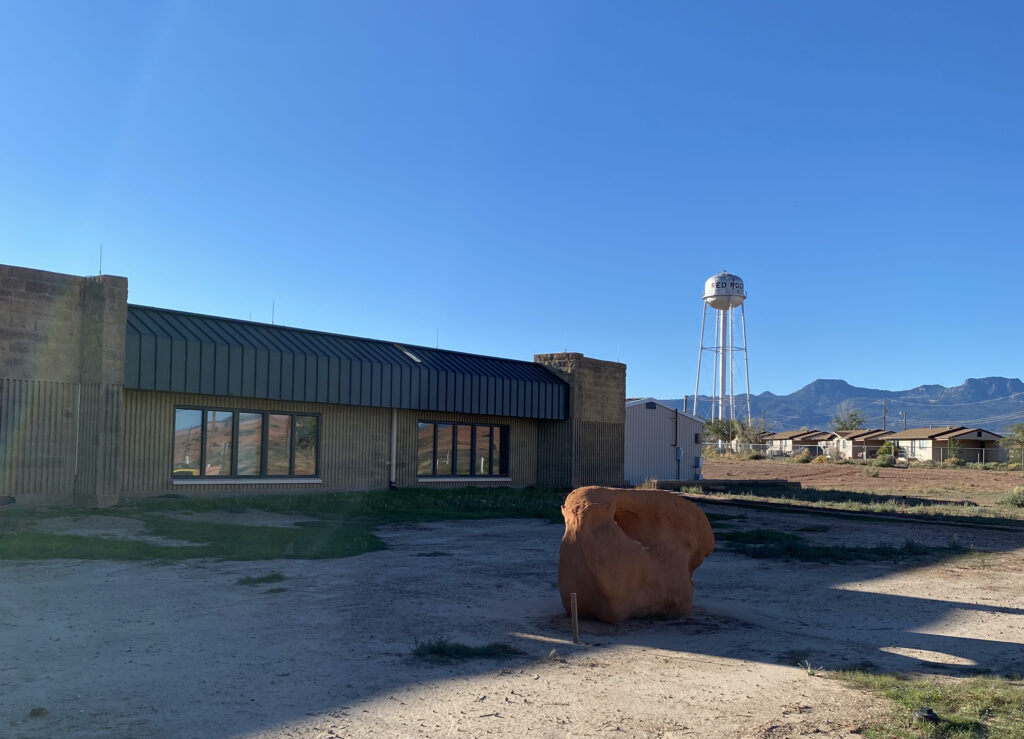Navajo Nation was hit especially hard by the pandemic, and our affiliated schools in Arizona have still been slow in getting students to return to in-class learning, without other problems that arise throughout the school year. Today we hear from our Director of U.S. Programs, Renée Kube, as she visits Red Rock Day School, where she hears from our volunteer coordinator about some of the other problems the school has faced while recovering from COVID-19.
Visiting with Patricia
“Red Rock Day School is in a very rural and isolated area. The Lukachukai Mountains can be a transportation barrier for families who want to go south to Lukachukai and Chinle. If they want to go north, the roads are even smaller and more poorly maintained. The closest small northern communities are Beclabito, New Mexico and Teec Nos Pos, Arizona, at which points a U.S. highway can be accessed,” said Renée.
“There are many children being raised by grandparents because their parents cannot do so – some are incapable, while others are working low wage jobs in Farmington, New Mexico or even in Colorado.”
“Our long-term volunteer coordinator, Patricia, contacted me in advance to warn that the school was experiencing water problems and had closed. The students were put back on virtual instruction. She was hoping things would be repaired by the time of our visit, but that was unfortunately not the case.”
“When I arrived, Patricia was there but the students were not. Regardless, she was happy to give me a tour of the school while we caught up about our sponsorship program,” said Renée.
Children Raised by grandparents
“As we walked, we talked. Patricia shared that the kindergarten through 8th grade school has the capacity for 110 students, but enrollment has fallen 46% since the pandemic started. Staffing has suffered, and those who remain are doing multiple jobs. The disruption and uncertainty have also had a negative impact on the children’s academics. The children’s overall math proficiency rate is less than 5%. (The Arizona state average is 45%.) Their proficiency in reading and language is at the 20-24% level. There are many children being raised by grandparents because their parents cannot do so – some are incapable, while others are working low wage jobs in Farmington, New Mexico or even in Colorado.”
“During the pandemic, much of our sponsorship funds were used for food. Staff bought dollar store laundry baskets and filled them with food. During the next round of drop offs, the empty baskets were turned in, and full baskets were given in return,” said Renée.

COVID-19 devastated Navajo Nation, making our affiliated schools in Arizona even more precautious about spreading the illness.
“Patricia said that this school year was the first time since the pandemic that the building was open to in-person instruction. Some families have chosen to remain virtual, as they have family members who are medically vulnerable. And while school was open in August and September, it was closed in October due to the water problems. This has been very disappointing for the children and the entire Red Rock Day School community.”
Getting help from our special funds
“Patricia showed us the school’s courtyard, which has a tree that was planted years ago by one of the teachers. The children love this space. Patricia said she may be interested in applying for a Hope In Action Program grant for a few more picnic tables, so that teachers could host outdoor lessons, especially for science classes,” said Renée.
“Then she took me to the library, which features a beautiful octagonal skylight. The school lost its librarian several years ago and has not had the funds to hire another. Patricia and a couple of teachers take turns helping the children to check out books, but library time had to be reduced. There’s no budget for new books. Patricia would like to ask for help with more books, but she hesitates to do so while they are so short-staffed.”
“Patricia hopes to work on enrolling more students once the water is repaired and the children have returned. After the pandemic forced virtual instruction, she is praying for a return to normalcy,” said Renée.
“This has been a long term and stable site for our organization, and Patricia has done a good job handling all our sponsorship programs, considering all the stress that she and other staff members are under.”
***
How do I sponsor a child with Children Incorporated?
You can sponsor a child in one of three ways: call our office at 1-800-538-5381 and speak with one of our staff members; email us at sponsorship@children-inc.org; or go online to our sponsorship portal, create an account, and search for a child that is available for sponsorship.

